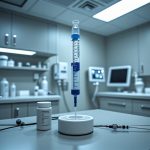We often approach hydration as an afterthought – something we should do, rather than an integral part of our daily lives. It’s easy to get caught up in busy schedules, forgetting to sip water until thirst kicks in, which is already a sign that you’re mildly dehydrated. This reactive approach misses the point; consistent hydration isn’t about chugging large amounts sporadically but about subtly integrating fluid intake into your existing routines and respecting the natural rhythms of your day. A well-planned hydration strategy isn’t restrictive or demanding – it’s supportive, enhancing energy levels, focus, and overall wellbeing without requiring monumental effort.
The beauty of effective water planning lies in its personalization. There’s no one-size-fits-all answer to how much water you should drink. Factors like activity level, climate, diet, and individual metabolism all play a role. Instead of fixating on arbitrary daily goals (like eight glasses), the focus should be on understanding when your body needs hydration most and building habits that naturally accommodate those needs. This isn’t about adding another task to your to-do list; it’s about weaving hydration seamlessly into what you already do, making it a natural extension of your daily rhythm.
Understanding Your Daily Hydration Needs
Hydration isn’t static – it fluctuates throughout the day based on our activities and environment. A sedentary morning requires less fluid than an intense workout or spending time outdoors in hot weather. Recognizing these variations is key to effective planning. Consider your typical day: when are you most active? When do you experience peak mental focus? When are you prone to stress, which can deplete fluids? Identifying these points allows you to strategically place hydration reminders and habits where they’ll have the greatest impact.
Beyond activity, what you eat also influences hydration needs. Diets high in sodium or processed foods can increase fluid requirements, while fruits and vegetables contribute to your overall intake. Caffeine and alcohol are diuretics, meaning they promote water loss, so compensating for their consumption is essential. Paying attention to these dietary factors allows for a more nuanced approach to water planning, moving beyond generic recommendations. The goal isn’t simply to drink a certain amount of water but to maintain fluid balance throughout the day, adapting to your body’s ever-changing needs. Consider how foods that help urine volume stay consistent can play a role in this balance.
Finally, listen to your body. Thirst is a late indicator of dehydration – ideally, you want to stay ahead of it. Pay attention to early signs like fatigue, headaches, or difficulty concentrating. These are subtle cues that suggest you may need to increase your fluid intake. Remember, consistent hydration isn’t about preventing thirst; it’s about proactively supporting optimal bodily function.
Integrating Water into Existing Routines
The most sustainable water planning strategies are those that don’t feel like a chore. Instead of trying to force yourself to drink more water, integrate it into routines you already have established. This minimizes effort and increases the likelihood of sticking with your plan. Here are some practical ideas:
- Drink a glass of water immediately upon waking. This rehydrates your body after sleep and sets a positive tone for the day.
- Keep a water bottle visible at your workspace or wherever you spend most of your time. Visual reminders encourage frequent sips.
- Pair water intake with other habits, such as drinking a glass before each meal or snack.
- Set alarms or use apps to remind yourself to drink water throughout the day, but avoid setting them too frequently – aim for gentle nudges rather than constant interruptions.
These simple integrations transform hydration from an obligation into a natural part of your daily flow. The key is consistency and finding methods that fit seamlessly into your lifestyle. Don’t overthink it; start with one or two habits and gradually build from there.
Hydration for Peak Performance & Focus
Many people underestimate the impact of hydration on cognitive function. Even mild dehydration can impair concentration, memory, and decision-making abilities. Maintaining optimal hydration levels is crucial for peak mental performance, especially during tasks that require focus and attention. Consider these strategies:
- Drink water before, during, and after periods of intense mental work. This ensures your brain has the fluids it needs to function optimally.
- Keep water readily available during meetings or study sessions. Having a sip within reach encourages regular intake.
- If you find yourself struggling to focus, take a short hydration break – step away from your work, drink some water, and stretch. This can help restore mental clarity.
Hydration isn’t just about physical health; it’s also about supporting cognitive wellbeing and enhancing productivity. By prioritizing fluid intake, you’re investing in your ability to think clearly, focus effectively, and perform at your best. It is essential for a productive workday. Planning afternoon water breaks can ensure sustained focus.
Tailoring Hydration to Your Day Rhythm
Everyone experiences different energy levels and demands throughout the day. A “one-size-fits-all” hydration plan simply won’t work. The most effective approach is to tailor your water intake to your unique rhythm. For example:
- Morning: Focus on rehydration after sleep with a large glass of water, potentially adding lemon for taste and added benefits.
- Midday: Increase fluid intake during periods of peak activity or mental focus. This might involve sipping water continuously while working or exercising.
- Evening: Moderate fluid intake before bed to avoid nighttime disruptions, but ensure you’re adequately hydrated after dinner.
Consider your sleep schedule as well. If you’re a night owl, adjust your hydration plan accordingly, ensuring adequate fluids throughout the evening and early morning. Conversely, if you’re an early bird, prioritize hydration first thing in the morning. The goal is to align water intake with your natural energy cycles, maximizing its benefits and minimizing any disruptions. You might also consider how daily routines can help prevent nighttime urge.





















